
Exhibit 99.01

© 2017 Tonix Pharmaceuticals Holding Corp. January 2017 Version P0050 1 - 31 - 17 Investor Presentation

© 2017 Tonix Pharmaceuticals Holding Corp. 2 Cautionary Note on Forward - Looking Statements Certain statements in this presentation regarding strategic plans, expectations and objectives for future operations or results are “forward - looking statements” as defined by the Private Securities Litigation Reform Act of 1995 . These statements may be identified by the use of forward - looking words such as “anticipate,” “believe,” “forecast,” “estimate” and “intend,” among others . These forward - looking statements are based on Tonix’s current expectations and actual results could differ materially . There are a number of factors that could cause actual events to differ materially from those indicated by such forward - looking statements . These factors include, but are not limited to, substantial competition ; our need for additional financing ; uncertainties of patent protection and litigation ; uncertainties of government or third party payor reimbursement ; limited research and development efforts and dependence upon third parties ; and risks related to failure to obtain U . S . Food and Drug Administration clearances or approvals and noncompliance with its regulations . As with any pharmaceutical under development, there are significant risks in the development, regulatory approval and commercialization of new products . The forward - looking statements in this presentation are made as of the date of this presentation, even if subsequently made available by the Company on its website or otherwise . Tonix does not undertake an obligation to update or revise any forward - looking statement, except as required by law . Investors should read the risk factors set forth in the Annual Report on Form 10 - K for the year ended December 31 , 2015 , as filed with the Securities and Exchange Commission (the “SEC”) on March 3 , 2016 , and future periodic reports filed with the SEC on or after the date hereof . All of the Company's forward - looking statements are expressly qualified by all such risk factors and other cautionary statements .

© 2017 Tonix Pharmaceuticals Holding Corp. 3 Tonix (TNXP): Developing Innovative Pharmaceutical Products to Address Current and Emerging Public Health Challenges Targeting central nervous system conditions • Phase 3 - ready drug, TNX - 102 SL* for posttraumatic stress disorder (PTSD) with Breakthrough Therapy designation • Encouraging evidence of safety and efficacy was demonstrated in Phase 2 AtEase trial of military - related PTSD formed the basis of the Breakthrough Therapy designation • Regulatory clarity for PTSD based on U.S. Food and Drug Administration (FDA) acceptance of PTSD Phase 3 clinical program at End - of - Phase 2 meeting • Expedited development and accelerated review are expected • Second clinical candidate for PTSD with a different mechanism of action in pre - IND stage development Other development efforts includes a smallpox preventing vaccine program which leverages our government affairs efforts and capabilities • Development of medical countermeasure drugs and biologics is incentivized with Priority Review Voucher by the recently enacted “21 st Century Cures Act” * TNX - 102 SL (cyclobenzaprine HCl sublingual tablets) is an Investigational New Drug and has not been approved for any indicatio n

© 2017 Tonix Pharmaceuticals Holding Corp. 4 Product Pipeline Preclinical Phase 2 NDA/BLA Market Candidate Indication Phase 3 TNX - 102 SL PTSD 505(b)(2) Phase 2 results reported May, 2016 PTSD TNX - 601 505(b)(1) Novel polymorph and salt discovered and characterized TNX - 801* 601 (h) Novel virus vaccine discovered and characterized Smallpox vaccine Cyclobenzaprine HCl sublingual tablets Tianeptine oral formulation Live virus vaccine from cell culture Registration Plan Phase 1 Approval of biological products when human efficacy studies are not ethical or feasible First time approval in the U.S., leverage ex - U.S. experience New route of administration and new indication for approved drug Expected to enroll 1Q 2017 * Medical countermeasure (MCM) eligible for Priority Review Voucher

© 2017 Tonix Pharmaceuticals Holding Corp. 5 Tonix Pharmaceuticals PTSD Program Phase 3 Ready Program Targeting a Current and Emerging Public Health Challenge TNX - 102 SL (cyclobenzaprine HCl sublingual tablets) • A unique, innovative pr oduct designed for bedtime administration • Targeting a chronic and serious psychiatric disorder: PTSD x Therapeutic dose identified in Phase 2 study x Phase 3 clinical and product registration plan accepted by the FDA 1 x Designated Breakthrough Therapy for expedited development and review x Initial Breakthrough Therapy meeting with FDA scheduled 1Q 2017 x Targe ting commencement of Phase 3 study in military - related PTSD in 1Q 2017 PTSD • High prevalence worldwide and receiving greater attention • Not well served - high off - label usage 2 with unproven or contraindicated treatments 3 • Potential opportunity to displace current standard - of - care and expand market 1. August 2016 FDA End - of - Phase 2 Meeting Minutes 2. Bernardy et al., J Clin Psychiatry, 2012; 73: 297 3. VA/DoD Clinical Practice Guideline for the Management of Post - Traumatic Stress, Version 2, 2010

© 2017 Tonix Pharmaceuticals Holding Corp. 6 PTSD Characteristics • Unmet medical need • PTSD is a serious condition and the prevalence is increasing, especially combat PTSD • Military - related PTSD is not satisfactorily treated by existing FDA approved therapies • Two selective serotonin reuptake inhibitors (SSRIs) are approved for PTSD, but have not shown efficacy in military - related PTSD • Endpoint • TNX - 102 SL 5.6 mg had significant effects on the FDA - recognized primary endpoint, the Clinician - Administered PTSD Scale for DSM - 5, “CAPS - 5” • Potential development and partners • Several companies have U.S. psychiatry - focused specialty sales forces • Department of Defense (DoD) is interested in military - related PTSD and has the capacity to support basic science and clinical development • Important target population • U.S. veterans are in great need of a medicine that works for this serious condition
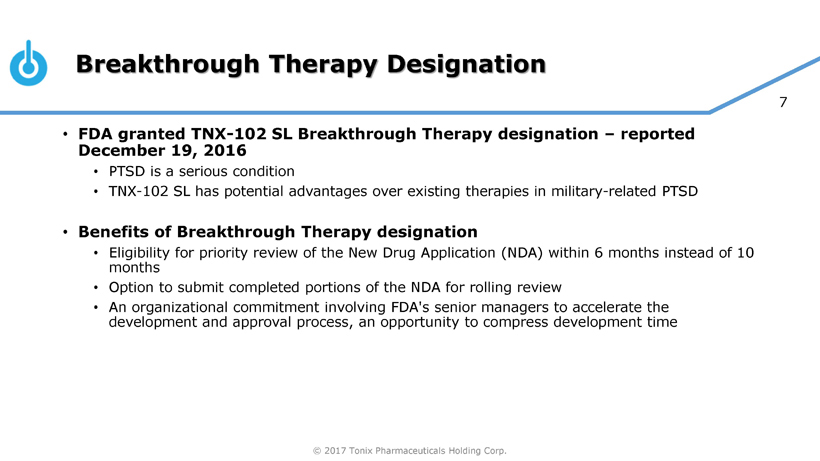
© 2017 Tonix Pharmaceuticals Holding Corp. 7 Breakthrough Therapy Designation • FDA granted TNX - 102 SL Breakthrough Therapy designation – reported December 19, 2016 • PTSD is a serious condition • TNX - 102 SL has potential advantages over existing therapies in military - related PTSD • Benefits of Breakthrough Therapy designation • Eligibility for priority review of the New Drug Application (NDA) within 6 months instead of 10 months • Option to submit completed portions of the NDA for rolling review • An organizational commitment involving FDA's senior managers to accelerate the development and approval process, an opportunity to compress development time
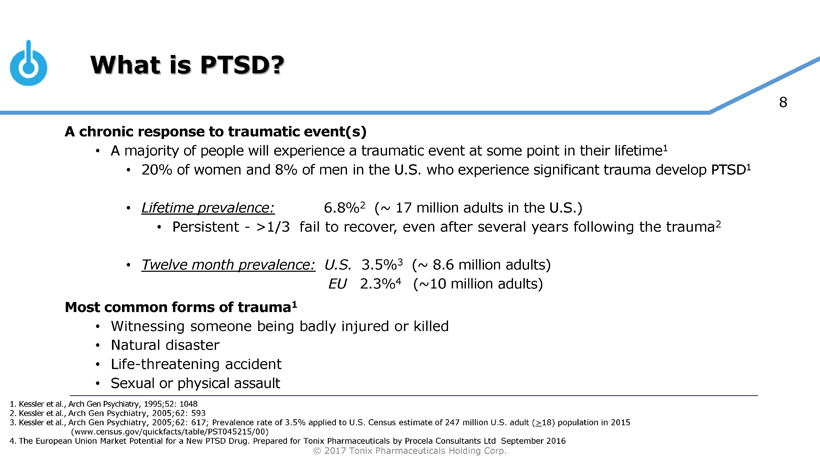
© 2017 Tonix Pharmaceuticals Holding Corp. 8 What is PTSD? A chronic response to traumatic event(s) • A majority of people will experience a traumatic event at some point in their lifetime 1 • 20% of women and 8% of men in the U.S. who experience significant trauma develop PTSD 1 • Lifetime prevalence: 6.8% 2 (~ 17 million adults in the U.S.) • Persistent - >1/3 fail to recover, even after several years following the trauma 2 • Twelve month prevalence: U.S. 3.5% 3 (~ 8.6 million adults) EU 2.3% 4 (~10 million adults) Most common forms of trauma 1 • Witnessing someone being badly injured or killed • Natural disaster • Life - threatening accident • Sexual or physical assault 1. Kessler et al., Arch Gen Psychiatry, 1995;52: 1048 2. Kessler et al., Arch Gen Psychiatry, 2005;62: 593 3. Kessler et al., Arch Gen Psychiatry, 2005 ; 62: 617 ; Prevalence rate of 3.5% applied to U.S. Census estimate of 247 million U.S. adult ( > 18) population in 2015 (www.census.gov/quickfacts/table/PST045215/00) 4. The European Union Market Potential for a New PTSD Drug. Prepared for Tonix Pharmaceuticals by Procela Consultants Ltd Septe mbe r 2016
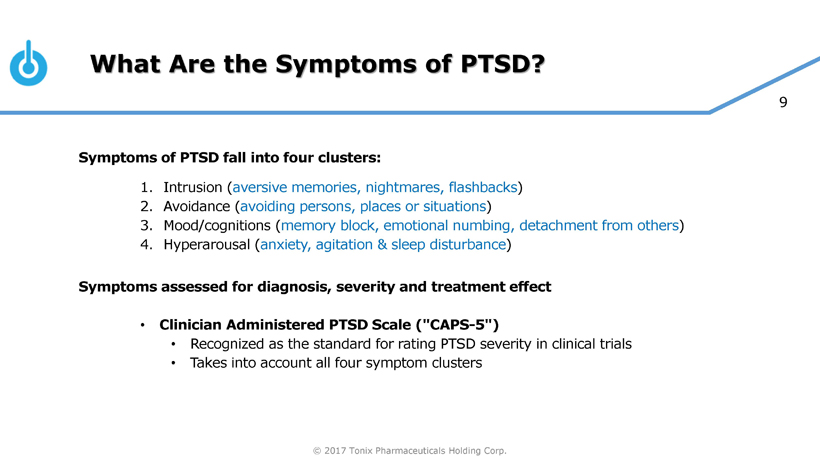
© 2017 Tonix Pharmaceuticals Holding Corp. 9 What Are the Symptoms of PTSD? Symptoms of PTSD fall into four clusters: 1. Intrusion ( aversive memories, nightmares, flashbacks ) 2. Avoidance ( avoiding persons, places or situations ) 3. Mood/cognitions ( memory block, emotional numbing, detachment from others ) 4. Hyperarousal ( anxiety, agitation & sleep disturbance ) Symptoms assessed for diagnosis, severity and treatment effect • Clinician Administered PTSD Scale ("CAPS - 5") • Recognized as the standard for rating PTSD severity in clinical trials • Takes into account all four symptom clusters
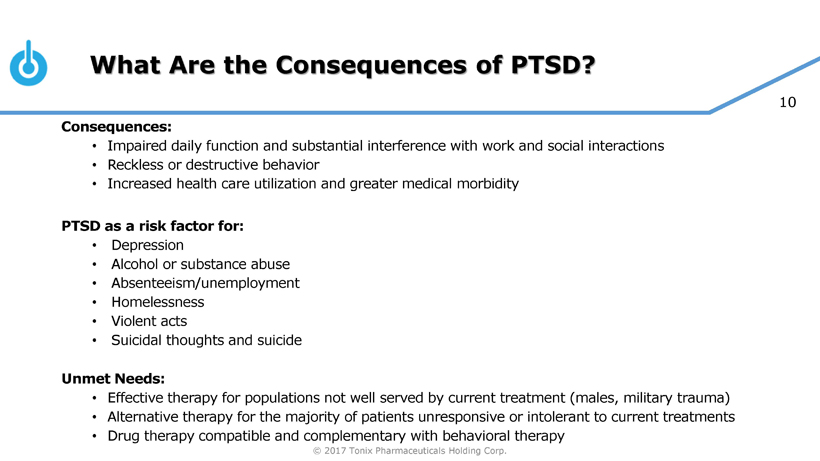
© 2017 Tonix Pharmaceuticals Holding Corp. 10 What Are the Consequences of PTSD? Consequences: • Impaired daily function and substantial interference with work and social interactions • Reckless or destructive behavior • Increased health care utilization and greater medical morbidity PTSD as a risk factor for: • Depression • Alcohol or substance abuse • Absenteeism/unemployment • Homelessness • Violent acts • Suicidal thoughts and suicide Unmet Needs: • Effective therapy for populations not well served by current treatment (males, military trauma) • Alternative therapy for the majority of patients unresponsive or intolerant to current treatments • Drug therapy compatible and complementary with behavioral therapy
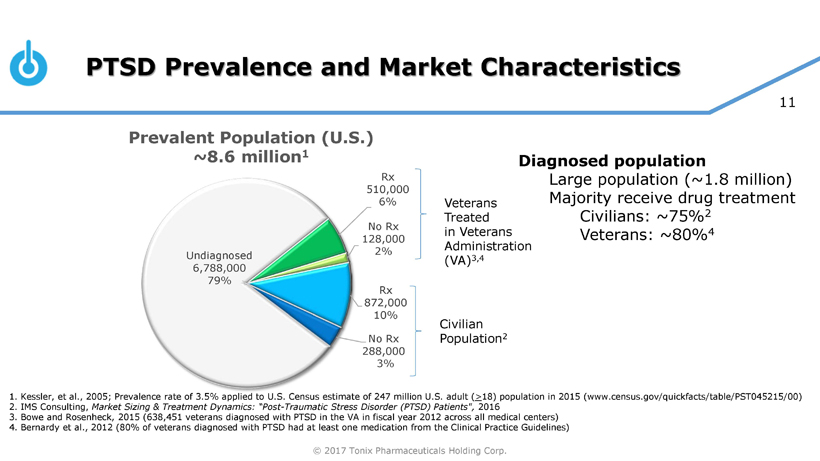
© 2017 Tonix Pharmaceuticals Holding Corp. 11 PTSD Prevalence and Market Characteristics [CATEGORY NAME] [VALUE] [PERCENTAG E] Rx [VALUE] [PERCENTAG E] No Rx [VALUE] [PERCENTAG E] Rx [VALUE] [PERCENTAG E] No Rx [VALUE] [PERCENTAG E] 1. Kessler, et al., 2005; Prevalence rate of 3.5% applied to U.S. Census estimate of 247 million U.S. adult ( > 18) population in 2015 (www.census.gov/quickfacts/table/PST045215/00) 2. IMS Consulting, Market Sizing & Treatment Dynamics: “Post - Traumatic Stress Disorder (PTSD) Patients", 2016 3. Bowe and Rosenheck, 2015 (638,451 veterans diagnosed with PTSD in the VA in fiscal year 2012 across all medical centers) 4. Bernardy et al., 2012 (80% of veterans diagnosed with PTSD had at least one medication from the Clinical Practice Guidelin es) Veterans Treated in Veterans Administration (VA) 3,4 Civilian Population 2 Diagnosed population Large population (~1.8 million) Majority receive drug treatment Civilians: ~75% 2 Veterans: ~80% 4 Prevalent Population (U.S.) ~8.6 million 1
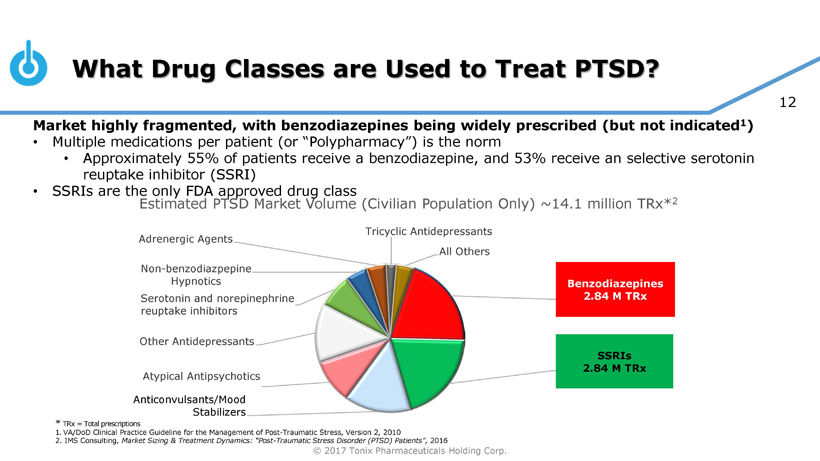
© 2017 Tonix Pharmaceuticals Holding Corp. 12 What Drug Classes are Used to Treat PTSD? * TRx = Total prescriptions 1. VA/DoD Clinical Practice Guideline for the Management of Post - Traumatic Stress, Version 2, 2010 2. IMS Consulting, Market Sizing & Treatment Dynamics: “Post - Traumatic Stress Disorder (PTSD) Patients", 2016 [CATEGORY NAME] 2.84 M TRx SSRIs 2.84 M TRx Anticonvulsants/Mood Stabilizers Atypical Antipsychotics Other Antidepressants Serotonin and norepinephrine reuptake inhibitors Non - benzodiazpepine Hypnotics Adrenergic Agents Tricyclic Antidepressants All Others Estimated PTSD Market Volume (Civilian Population Only) ~14.1 million TRx* 2 Market highly fragmented, with benzodiazepines being widely prescribed (but not indicated 1 ) • Multiple medications per patient (or “Polypharmacy”) is the norm • Approximately 55% of patients receive a benzodiazepine, and 53% receive an selective serotonin reuptake inhibitor (SSRI) • SSRIs are the only FDA approved drug class
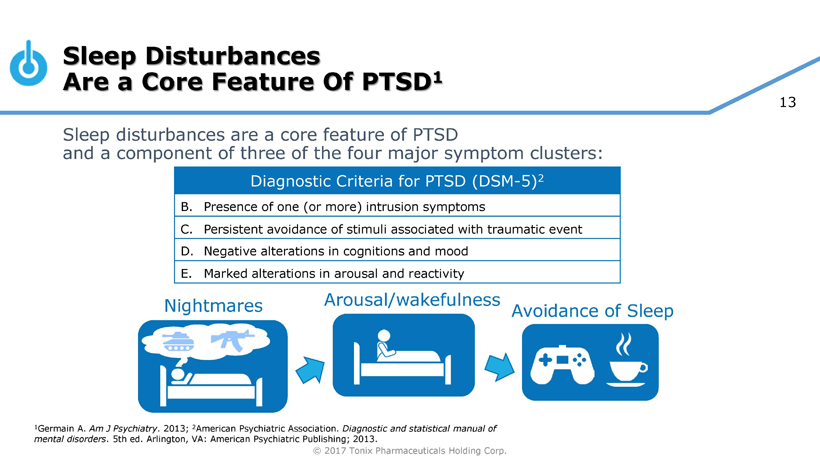
© 2017 Tonix Pharmaceuticals Holding Corp. 13 Sleep Disturbances Are a Core Feature Of PTSD 1 Sleep disturbances are a core feature of PTSD and a component of three of the four major symptom clusters: 1 Germain A. Am J Psychiatry . 2013; 2 American Psychiatric Association. Diagnostic and statistical manual of mental disorders . 5th ed. Arlington, VA: American Psychiatric Publishing; 2013. Diagnostic Criteria for PTSD (DSM - 5) 2 B. Presence of one (or more) intrusion symptoms C. Persistent avoidance of stimuli associated with traumatic event D. Negative alterations in cognitions and mood E. Marked alterations in arousal and reactivity Nightmares Arousal/wakefulness Avoidance of Sleep
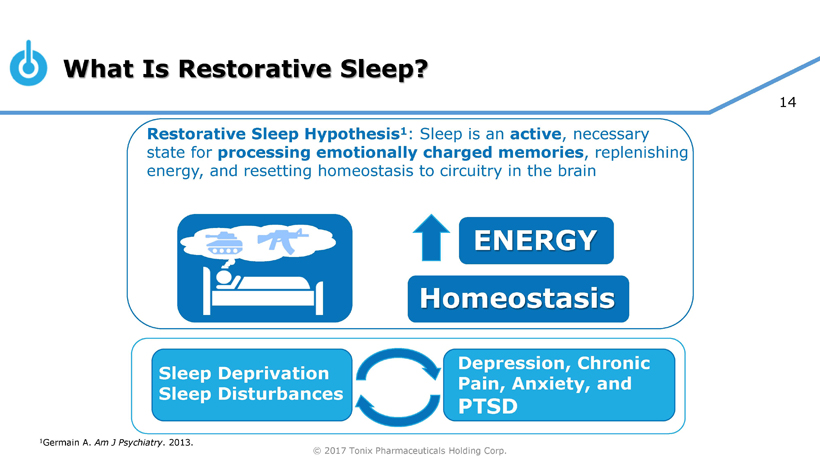
© 2017 Tonix Pharmaceuticals Holding Corp. 14 What Is Restorative Sleep? Restorative Sleep Hypothesis 1 : Sleep is an active , necessary state for processing emotionally charged memories , replenishing energy, and resetting homeostasis to circuitry in the brain Homeostasis Sleep Deprivation Sleep Disturbances Depression, Chronic Pain, Anxiety, and PTSD 1 Germain A. Am J Psychiatry . 2013. ENERGY
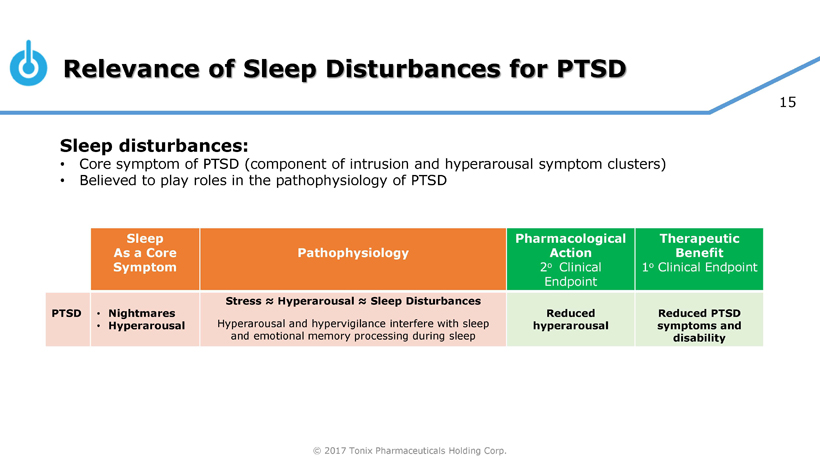
© 2017 Tonix Pharmaceuticals Holding Corp. 15 Relevance of Sleep Disturbances for PTSD Sleep disturbances: • Core symptom of PTSD (component of intrusion and hyperarousal symptom clusters) • Believed to play roles in the pathophysiology of PTSD om Sleep As a Core Symptom P athophysiology Pharmacological Action 2 o Clinical Endpoint Therapeutic Benefit 1 o Clinical Endpoint PTSD • Nightmares • Hyperarousal Stress ≈ Hyperarousal ≈ Sleep Disturbances Hyperarousal and hypervigilance interfere with sleep and emotional memory processing during sleep Reduced hyperarousal Reduced PTSD symptoms and disability
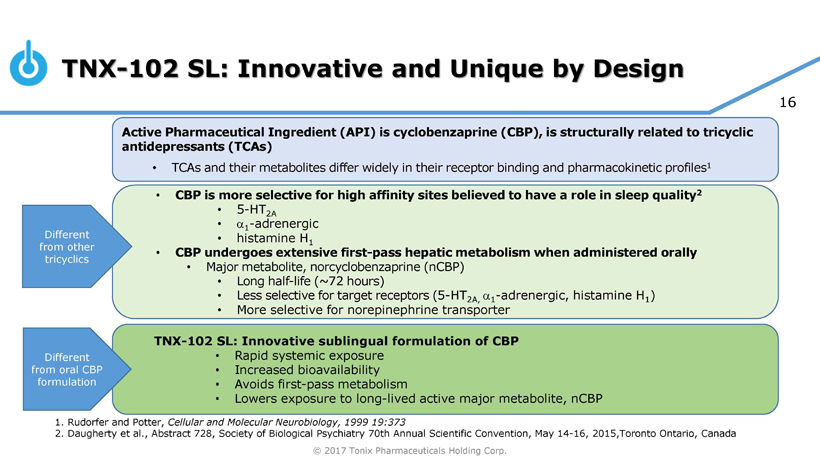
© 2017 Tonix Pharmaceuticals Holding Corp. 16 • CBP is more selective for high affinity sites believed to have a role in sleep quality 2 • 5 - HT 2A • a 1 - adrenergic • histamine H 1 • CBP undergoes extensive first - pass hepatic metabolism when administered orally • Major metabolite, norcyclobenzaprine (nCBP) • Long half - life (~72 hours) • Less selective for target receptors ( 5 - HT 2A, a 1 - adrenergic, histamine H 1 ) • More selective for norepinephrine transporter TNX - 102 SL: Innovative and Unique by Design Active Pharmaceutical Ingredient (API) is cyclobenzaprine (CBP), is structurally related to tricyclic antidepressants (TCAs) • TCAs and their metabolites differ widely in their receptor binding and pharmacokinetic profiles 1 TNX - 102 SL: Innovative sublingual formulation of CBP • Rapid systemic exposure • Increased bioavailability • Avoids first - pass metabolism • Lowers exposure to long - lived active major metabolite, nCBP Different from other tricyclics Different from oral CBP formulation 1. Rudorfer and Potter, Cellular and Molecular Neurobiology, 1999 19:373 2. Daugherty et al., Abstract 728, Society of Biological Psychiatry 70th Annual Scientific Convention, May 14 - 16, 2015,Toronto O ntario, Canada
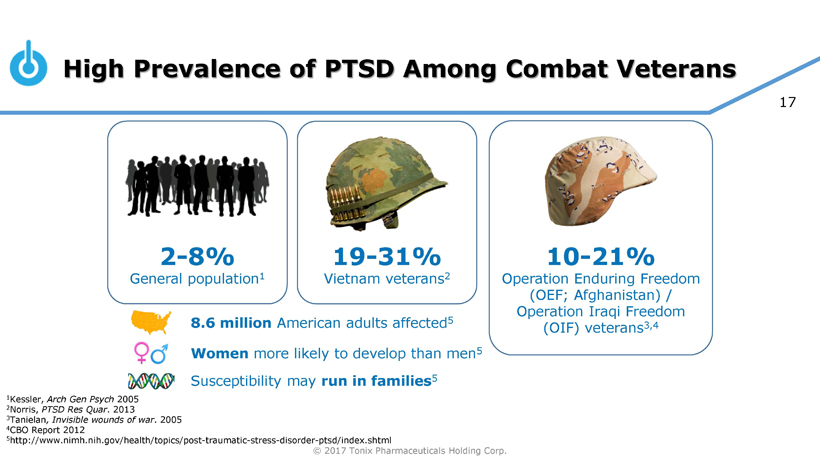
© 2017 Tonix Pharmaceuticals Holding Corp. 17 High Prevalence of PTSD Among Combat Veterans 1 Kessler, Arch Gen Psych 2005 2 Norris, PTSD Res Quar . 2013 3 Tanielan , Invisible wounds of war . 2005 4 CBO Report 2012 5 http://www.nimh.nih.gov/health/topics/post - traumatic - stress - disorder - ptsd/index.shtml 10 - 21% Operation Enduring Freedom (OEF; Afghanistan) / Operation Iraqi Freedom (OIF) veterans 3,4 2 - 8% General population 1 19 - 31% Vietnam veterans 2 8.6 million American adults affected 5 Women more likely to develop than men 5 Susceptibility may run in families 5
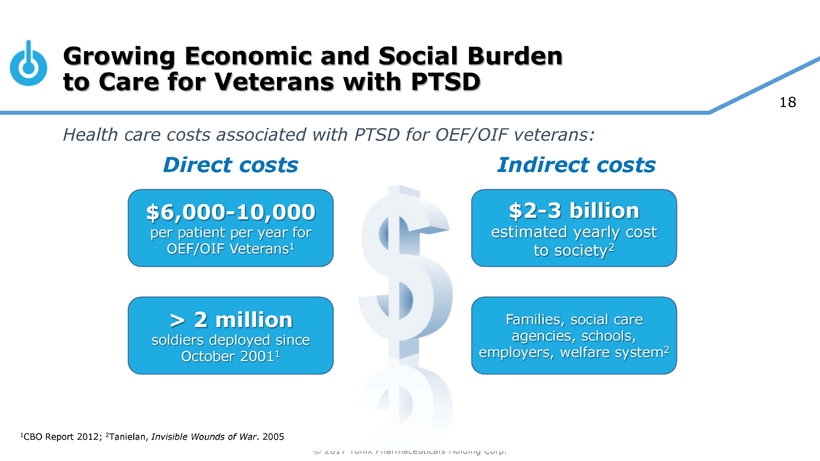
© 2017 Tonix Pharmaceuticals Holding Corp. 18 Growing Economic and Social Burden to Care for Veterans with PTSD Health care costs associated with PTSD for OEF/OIF veterans: Direct costs Indirect costs 1 CBO Report 2012; 2 Tanielan, Invisible Wounds of War . 2005 $6,000 - 10,000 per patient per year for OEF/OIF Veterans 1 > 2 million soldiers deployed since October 2001 1 $2 - 3 billion estimated yearly cost to society 2 Families, social care agencies, schools, employers, welfare system 2
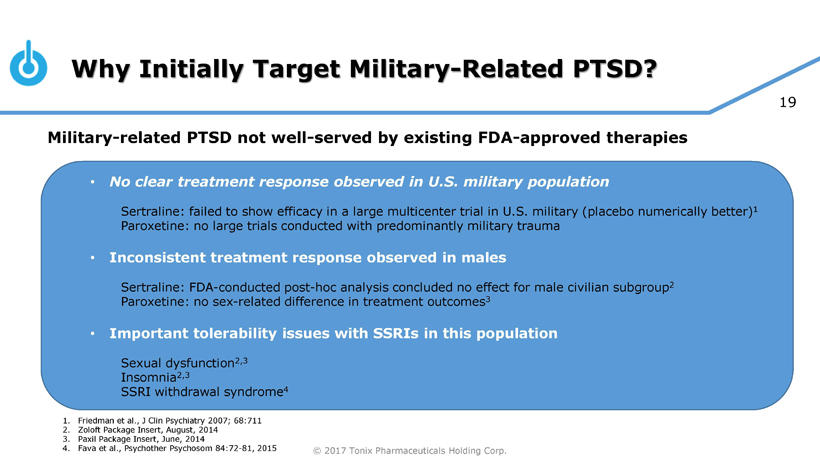
© 2017 Tonix Pharmaceuticals Holding Corp. 19 Why Initially Target Military - Related PTSD? 1. Friedman et al., J Clin Psychiatry 2007; 68:711 2. Zoloft Package Insert, August, 2014 3. Paxil Package Insert, June, 2014 4. Fava et al., Psychother Psychosom 84:72 - 81, 2015 Military - related PTSD not well - served by existing FDA - approved therapies • No clear treatment response observed in U.S. military population Sertraline: failed to show efficacy in a large multicenter trial in U.S. military (placebo numerically better) 1 Paroxetine: no large trials conducted with predominantly military trauma • Inconsistent treatment response observed in males Sertraline: FDA - conducted post - hoc analysis concluded no effect for male civilian subgroup 2 Paroxetine: no sex - related difference in treatment outcomes 3 • Important tolerability issues with SSRIs in this population Sexual dysfunction 2,3 Insomnia 2,3 SSRI withdrawal syndrome 4
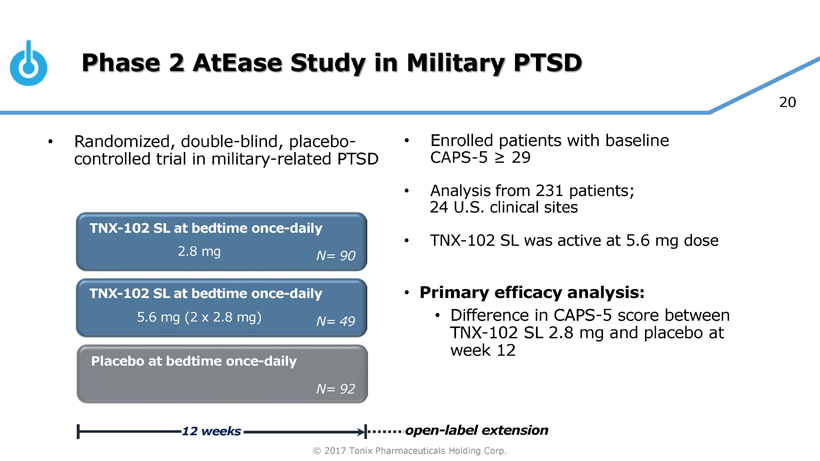
© 2017 Tonix Pharmaceuticals Holding Corp. 20 Phase 2 AtEase Study in Military PTSD • Enrolled patients with baseline CAPS - 5 ≥ 29 • Analysis from 231 patients; 24 U.S. clinical sites • TNX - 102 SL was active at 5.6 mg dose • Primary efficacy analysis: • Difference in CAPS - 5 score between TNX - 102 SL 2.8 mg and placebo at week 12 TNX - 102 SL at bedtime once - daily Placebo at bedtime once - daily 12 weeks N= 90 TNX - 102 SL at bedtime once - daily N= 92 N= 49 2.8 mg 5.6 mg (2 x 2.8 mg) open - label extension • Randomized, double - blind, placebo - controlled trial in military - related PTSD
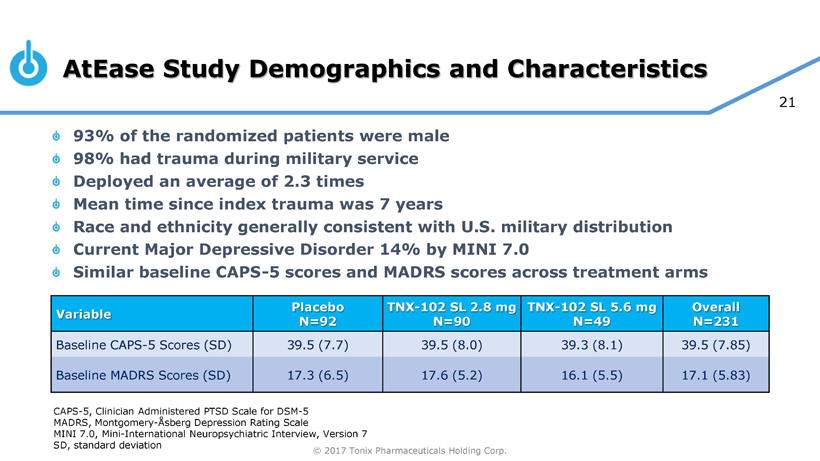
© 2017 Tonix Pharmaceuticals Holding Corp. 21 AtEase Study Demographics and Characteristics 93% of the randomized patients were male 98% had trauma during military service Deployed an average of 2.3 times Mean time since index trauma was 7 years Race and ethnicity generally consistent with U.S. military distribution Current Major Depressive Disorder 14% by MINI 7.0 Similar baseline CAPS - 5 scores and MADRS scores across treatment arms Variable Placebo N=92 TNX - 102 SL 2.8 mg N=90 TNX - 102 SL 5.6 mg N=49 Overall N=231 Baseline CAPS - 5 Scores (SD) 39.5 (7.7) 39.5 (8.0) 39.3 (8.1) 39.5 (7.85) Baseline MADRS Scores (SD) 17.3 (6.5) 17.6 (5.2) 16.1 (5.5) 17.1 (5.83) CAPS - 5, Clinician Administered PTSD Scale for DSM - 5 MADRS, Montgomery - Åsberg Depression Rating Scale MINI 7.0, Mini - International Neuropsychiatric Interview, Version 7 SD, standard deviation
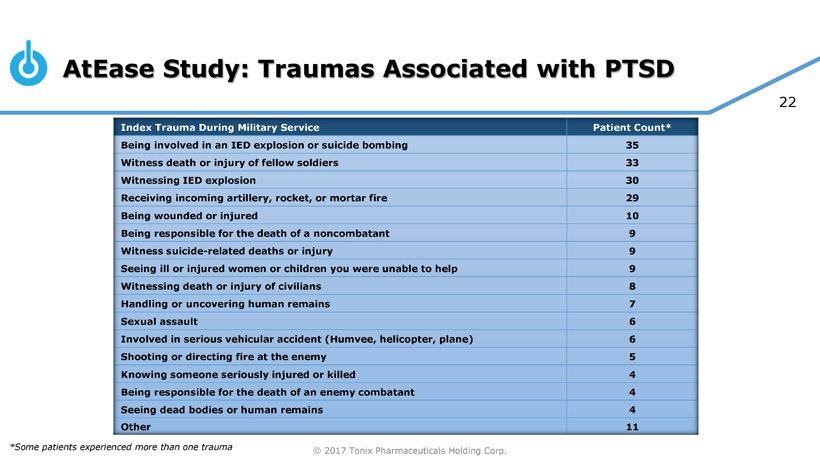
© 2017 Tonix Pharmaceuticals Holding Corp. 22 AtEase Study: Traumas Associated with PTSD Index Trauma During Military Service Patient Count* Being involved in an IED explosion or suicide bombing 35 Witness death or injury of fellow soldiers 33 Witnessing IED explosion 30 Receiving incoming artillery, rocket, or mortar fire 29 Being wounded or injured 10 Being responsible for the death of a noncombatant 9 Witness suicide - related deaths or injury 9 Seeing ill or injured women or children you were unable to help 9 Witnessing death or injury of civilians 8 Handling or uncovering human remains 7 Sexual assault 6 Involved in serious vehicular accident (Humvee, helicopter, plane) 6 Shooting or directing fire at the enemy 5 Knowing someone seriously injured or killed 4 Being responsible for the death of an enemy combatant 4 Seeing dead bodies or human remains 4 Other 11 *Some patients experienced more than one trauma
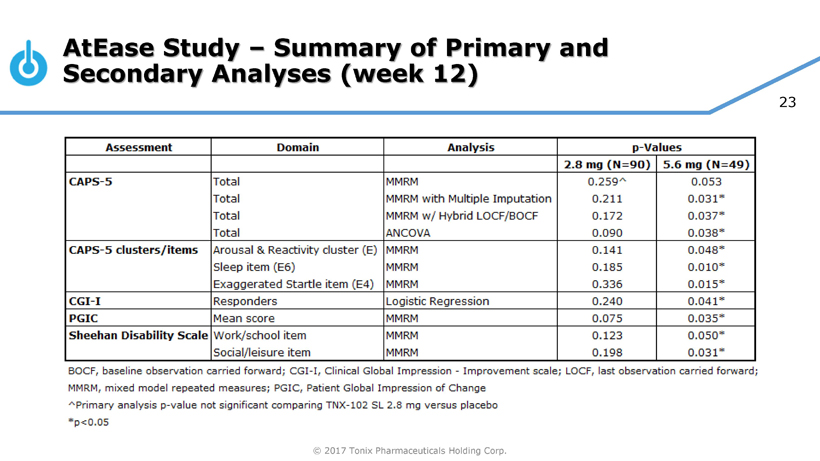
© 2017 Tonix Pharmaceuticals Holding Corp. 23 AtEase Study – Summary of Primary and Secondary Analyses (week 12)
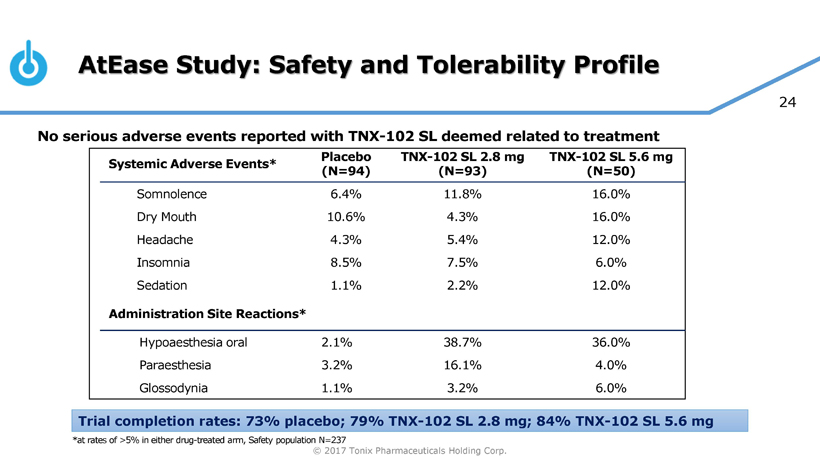
© 2017 Tonix Pharmaceuticals Holding Corp. 24 AtEase Study: Safety and Tolerability Profile No serious adverse events reported with TNX - 102 SL deemed related to treatment Systemic Adverse Events* Placebo (N=94) TNX - 102 SL 2.8 mg (N=93) TNX - 102 SL 5.6 mg (N=50) Somnolence 6.4% 11.8% 16.0% Dry Mouth 10.6% 4.3% 16.0% Headache 4.3% 5.4% 12.0% Insomnia 8.5% 7.5% 6.0% Sedation 1.1% 2.2% 12.0% Administration Site Reactions* Hypoaesthesia oral 2.1% 38.7% 36.0% Paraesthesia 3.2% 16.1% 4.0% Glossodynia 1.1% 3.2% 6.0% Trial completion rates: 73% placebo; 79% TNX - 102 SL 2.8 mg; 84% TNX - 102 SL 5.6 mg *at rates of >5% in either drug - treated arm, Safety population N=237
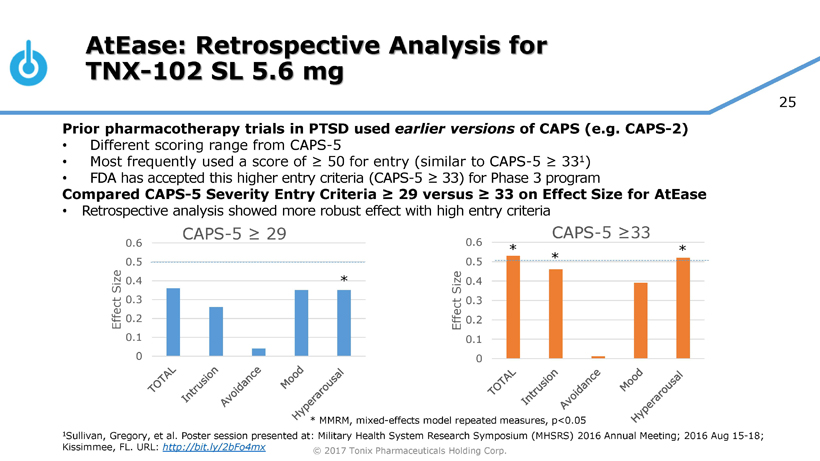
© 2017 Tonix Pharmaceuticals Holding Corp. 25 0 0.1 0.2 0.3 0.4 0.5 0.6 Effect Size CAPS - 5 ≥ 29 0 0.1 0.2 0.3 0.4 0.5 0.6 Effect Size CAPS - 5 ≥33 AtEase: Retrospective Analysis for TNX - 102 SL 5.6 mg * MMRM, mixed - effects model repeated measures, p<0.05 Prior pharmacotherapy trials in PTSD used earlier versions of CAPS (e . g . CAPS - 2 ) • Different scoring range from CAPS - 5 • Most frequently used a score of ≥ 50 for entry (similar to CAPS - 5 ≥ 33 1 ) • FDA has accepted this higher entry criteria (CAPS - 5 ≥ 33 ) for Phase 3 program Compared CAPS - 5 Severity Entry Criteria ≥ 29 versus ≥ 33 on Effect Size for AtEase • Retrospective analysis showed more robust effect with high entry criteria * * * * 1 Sullivan, Gregory, et al. Poster session presented at: Military Health System Research Symposium (MHSRS) 2016 Annual Meeting; 20 16 Aug 15 - 18; Kissimmee, FL. URL: http://bit.ly/2bFo4mx
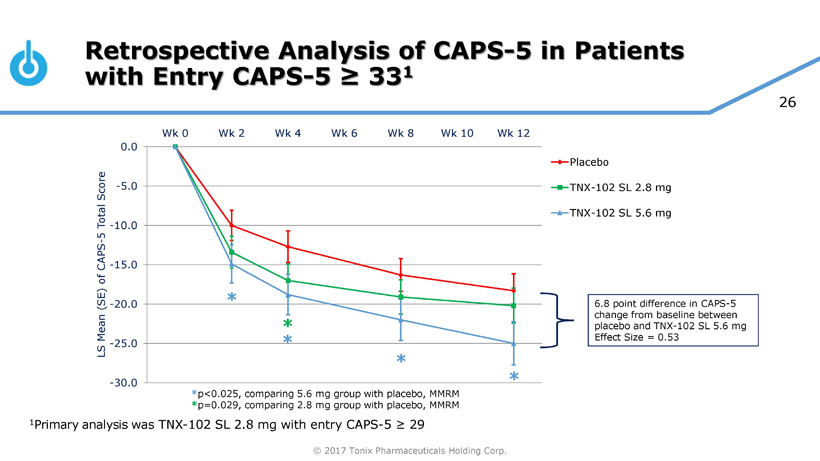
© 2017 Tonix Pharmaceuticals Holding Corp. 26 Retrospective Analysis of CAPS - 5 in Patients with Entry CAPS - 5 ≥ 33 1 -30.0 -25.0 -20.0 -15.0 -10.0 -5.0 0.0 Wk 0 Wk 2 Wk 4 Wk 6 Wk 8 Wk 10 Wk 12 LS Mean (SE) of CAPS - 5 Total Score Placebo TNX-102 SL 2.8 mg TNX-102 SL 5.6 mg 6.8 point difference in CAPS - 5 change from baseline between placebo and TNX - 102 SL 5.6 mg Effect Size = 0.53 * * * * * * p<0.025, comparing 5.6 mg group with placebo, MMRM * p=0.029, comparing 2.8 mg group with placebo, MMRM 1 Primary analysis was TNX - 102 SL 2.8 mg with entry CAPS - 5 ≥ 29
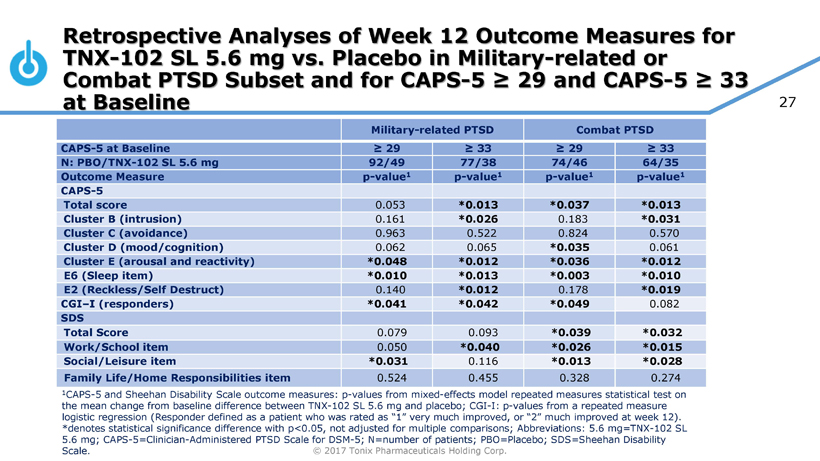
© 2017 Tonix Pharmaceuticals Holding Corp. 27 Retrospective Analyses of Week 12 Outcome Measures for TNX - 102 SL 5.6 mg vs. Placebo in Military - related or Combat PTSD Subset and for CAPS - 5 ≥ 29 and CAPS - 5 ≥ 33 at Baseline Military - related PTSD Combat PTSD CAPS - 5 at Baseline ≥ 29 ≥ 33 ≥ 29 ≥ 33 N: PBO/TNX - 102 SL 5.6 mg 92/49 77/38 74/46 64/35 Outcome Measure p - value 1 p - value 1 p - value 1 p - value 1 CAPS - 5 Total score 0.053 *0.013 *0.037 *0.013 Cluster B (intrusion) 0.161 *0.026 0.183 *0.031 Cluster C (avoidance) 0.963 0.522 0.824 0.570 Cluster D (mood/cognition) 0.062 0.065 *0.035 0.061 Cluster E (arousal and reactivity) *0.048 *0.012 *0.036 *0.012 E6 (Sleep item) *0.010 *0.013 *0.003 *0.010 E2 (Reckless/Self Destruct) 0.140 *0.012 0.178 *0.019 CGI – I (responders) *0.041 *0.042 *0.049 0.082 SDS Total Score 0.079 0.093 *0.039 *0.032 Work/School item 0.050 *0.040 *0.026 *0.015 Social/Leisure item *0.031 0.116 *0.013 *0.028 Family Life/Home Responsibilities item 0.524 0.455 0.328 0.274 1 CAPS - 5 and Sheehan Disability Scale outcome measures: p - values from mixed - effects model repeated measures statistical test on the mean change from baseline difference between TNX - 102 SL 5.6 mg and placebo; CGI - I: p - values from a repeated measure logistic regression (Responder defined as a patient who was rated as “1” very much improved, or “2” much improved at week 12) . *denotes statistical significance difference with p<0.05, not adjusted for multiple comparisons; Abbreviations: 5.6 mg=TNX - 102 S L 5.6 mg; CAPS - 5=Clinician - Administered PTSD Scale for DSM - 5; N=number of patients; PBO=Placebo; SDS=Sheehan Disability Scale.
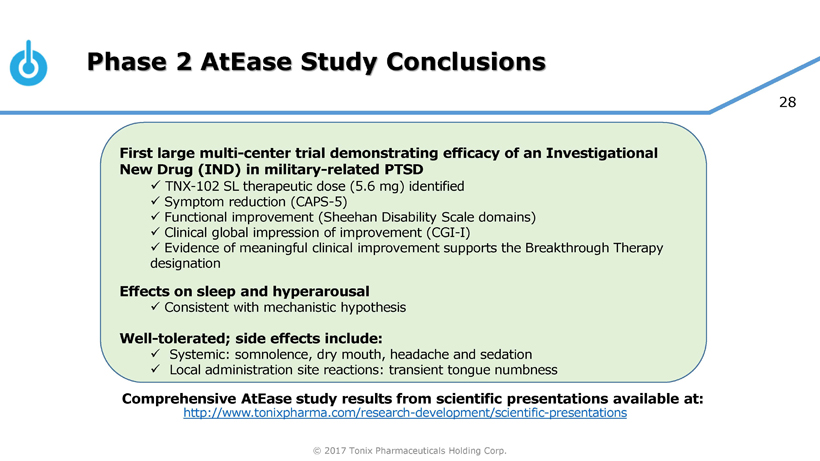
© 2017 Tonix Pharmaceuticals Holding Corp. 28 First large multi - center trial demonstrating efficacy of an Investigational New Drug (IND) in military - related PTSD x TNX - 102 SL therapeutic dose (5.6 mg) identified x Symptom reduction (CAPS - 5) x Functional improvement (Sheehan Disability Scale domains) x Clinical global impression of improvement (CGI - I) x Evidence of meaningful clinical improvement supports the Breakthrough Therapy designation Effects on sleep and hyperarousal x Consistent with mechanistic hypothesis Well - tolerated; side effects include: x Systemic: somnolence, dry mouth, headache and sedation x Local administration site reactions: transient tongue numbness Phase 2 AtEase Study Conclusions Comprehensive AtEase study results from scientific presentations available at: http://www.tonixpharma.com/research - development/scientific - presentations
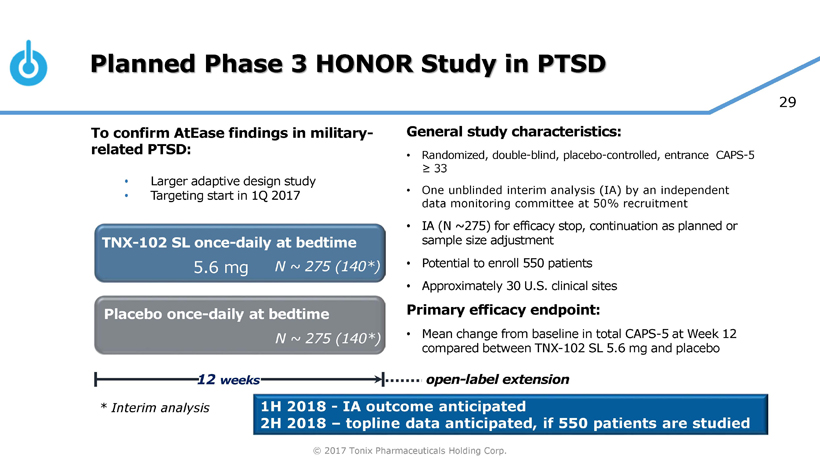
© 2017 Tonix Pharmaceuticals Holding Corp. 29 Planned Phase 3 HONOR Study in PTSD General s tudy c haracteristics: • Randomized, double - blind, placebo - controlled, entrance CAPS - 5 ≥ 33 • One unblinded interim analys i s ( IA) by an independent data monitoring committee at 50% recruitment • IA (N ~ 275 ) for efficacy stop , continuation as planned or sample size adjustment • Potential to enroll 550 patients • Approximately 30 U.S. clinical sites Primary e fficacy e ndpoint: • Mean change from baseline in total CAPS - 5 at Week 12 compared between TNX - 102 SL 5.6 mg and placebo Placebo once - daily at bedtime 12 weeks TNX - 102 SL once - daily at bedtime N ~ 275 (140*) N ~ 275 (140*) 5.6 mg 1H 2018 - IA outcome anticipated 2H 2018 – topline data anticipated, if 550 patients are studied To confirm AtEase findings in military - related PTSD: • Larger adaptive design study • Targeting start in 1Q 2017 * Interim analysis open - label extension
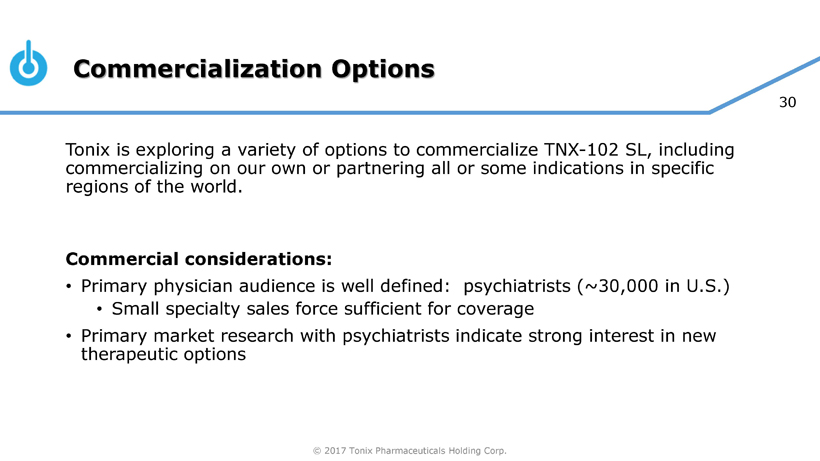
© 2017 Tonix Pharmaceuticals Holding Corp. 30 Commercialization Options Tonix is exploring a variety of options to commercialize TNX - 102 SL, including commercializing on our own or partnering all or some indications in specific regions of the world. Commercial considerations: • Primary physician audience is well defined: psychiatrists (~30,000 in U.S.) • Small specialty sales force sufficient for coverage • Primary market research with psychiatrists indicate strong interest in new therapeutic options
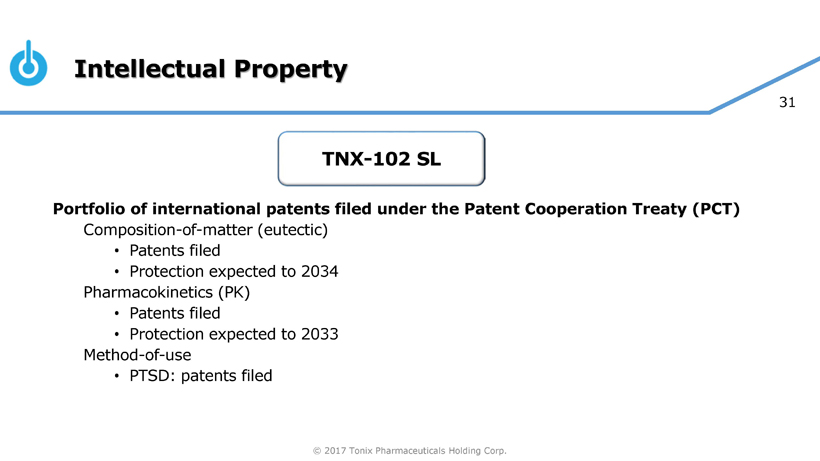
© 2017 Tonix Pharmaceuticals Holding Corp. 31 Intellectual Property Portfolio of international patents filed under the Patent Cooperation Treaty (PCT) C omposition - of - matter (eutectic) • Patents filed • Protection expected to 2034 Pharmacokinetics (PK) • Patents filed • Protection expected to 2033 Method - of - use • PTSD: patents filed TNX - 102 SL
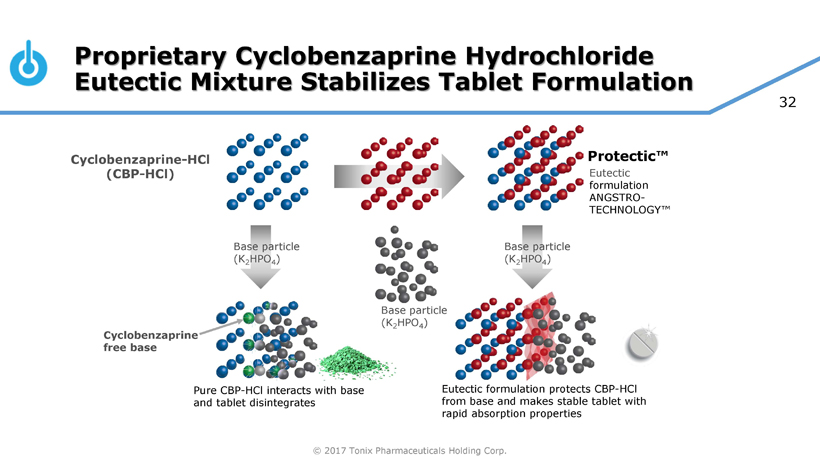
© 2017 Tonix Pharmaceuticals Holding Corp. 32 Proprietary Cyclobenzaprine Hydrochloride Eutectic Mixture Stabilizes Tablet Formulation Base particle (K 2 HPO 4 ) Base particle (K 2 HPO 4 ) Base particle (K 2 HPO 4 ) Eutectic formulation ANGSTRO - TECHNOLOGY™ Cyclobenzaprine - HCl (CBP - HCl) Eutectic formulation protects CBP - HCl from base and makes stable tablet with rapid absorption properties Pure CBP - HCl interacts with base and tablet disintegrates Cyclobenzaprine free base Protectic™
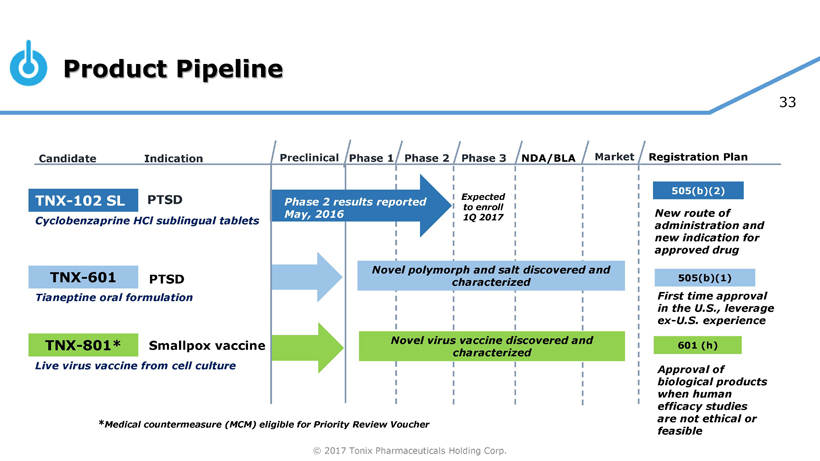
© 2017 Tonix Pharmaceuticals Holding Corp. 33 Product Pipeline Preclinical Phase 2 NDA/BLA Market Candidate Indication Phase 3 TNX - 102 SL PTSD 505(b)(2) Phase 2 results reported May, 2016 PTSD TNX - 601 505(b)(1) Novel polymorph and salt discovered and characterized TNX - 801* 601 (h) Novel virus vaccine discovered and characterized Smallpox vaccine Cyclobenzaprine HCl sublingual tablets Tianeptine oral formulation Live virus vaccine from cell culture Registration Plan Phase 1 Approval of biological products when human efficacy studies are not ethical or feasible First time approval in the U.S., leverage ex - U.S. experience New route of administration and new indication for approved drug Expected to enroll 1Q 2017 * Medical countermeasure (MCM) eligible for Priority Review Voucher
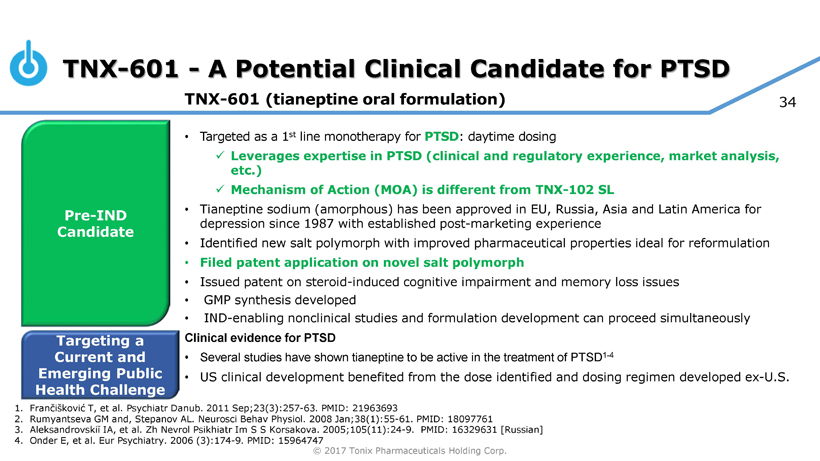
© 2017 Tonix Pharmaceuticals Holding Corp. 34 TNX - 601 - A Potential Clinical Candidate for PTSD Pre - IND Candidate TNX - 601 ( tianeptine oral formulation) • Targeted as a 1 st line monotherapy for PTSD : daytime dosing x Leverages expertise in PTSD (clinical and regulatory experience, market analysis, etc.) x Mechanism of Action (MOA) is different from TNX - 102 SL • Tianeptine sodium (amorphous) has been approved in EU, Russia, Asia and Latin America for depression since 1987 with established post - marketing experience • Identified new salt polymorph with improved pharmaceutical properties ideal for reformulation • Filed patent application on novel salt polymorph • Issued patent on steroid - induced cognitive impairment and memory loss issues • GMP synthesis developed • IND - enabling nonclinical studies and formulation development can proceed simultaneously Targeting a Current and Emerging Public Health Challenge Clinical evidence for PTSD • Several studies have shown tianeptine to be active in the treatment of PTSD 1 - 4 • US clinical development benefited from the dose identified and dosing regimen developed ex - U.S. 1. Frančišković T, et al. Psychiatr Danub . 2011 Sep;23(3):257 - 63. PMID: 21963693 2. Rumyantseva GM and, Stepanov AL. Neurosci Behav Physiol. 2008 Jan;38(1):55 - 61. PMID: 18097761 3. Aleksandrovskiĭ IA, et al. Zh Nevrol Psikhiatr Im S S Korsakova . 2005;105(11):24 - 9. PMID: 16329631 [Russian] 4. Onder E, et al. Eur Psychiatry. 2006 (3):174 - 9. PMID: 15964747
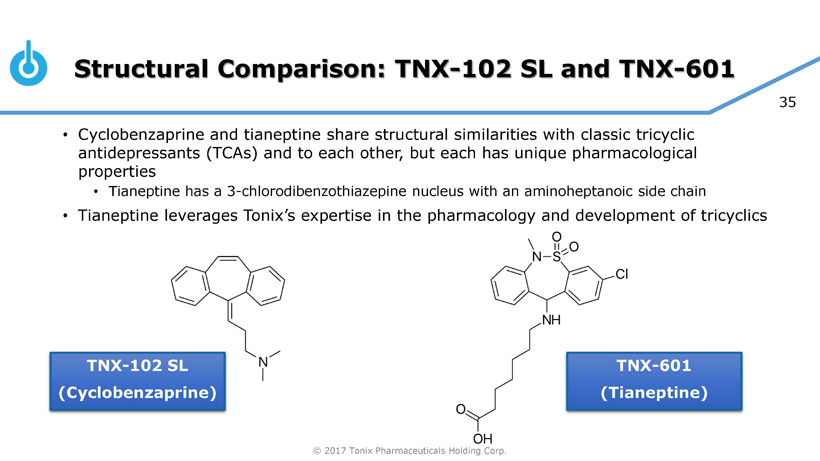
© 2017 Tonix Pharmaceuticals Holding Corp. 35 Structural Comparison: TNX - 102 SL and TNX - 601 • Cyclobenzaprine and tianeptine share structural similarities with classic tricyclic antidepressants (TCAs) and to each other, but each has unique pharmacological properties • Tianeptine has a 3 - chlorodibenzothiazepine nucleus with an aminoheptanoic side chain • Tianeptine leverages Tonix’s expertise in the pharmacology and development of tricyclics TNX - 102 SL (Cyclobenzaprine) TNX - 601 (Tianeptine)
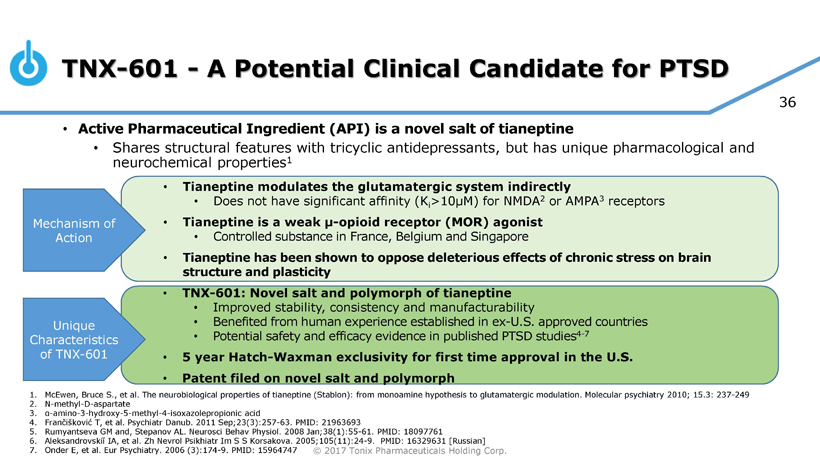
© 2017 Tonix Pharmaceuticals Holding Corp. 36 • Tianeptine modulates the glutamatergic system indirectly • Does not have significant affinity (K i >10 μ M) for NMDA 2 or AMPA 3 receptors • Tianeptine is a weak µ - opioid receptor (MOR) agonist • Controlled substance in France, Belgium and Singapore • Tianeptine has been shown to oppose deleterious effects of chronic stress on brain structure and plasticity TNX - 601 - A Potential Clinical Candidate for PTSD • TNX - 601: Novel salt and polymorph of tianeptine • Improved stability, consistency and manufacturability • Benefited from human experience established in ex - U.S. approved countries • Potential safety and efficacy evidence in published PTSD studies 4 - 7 • 5 year Hatch - Waxman exclusivity for first time approval in the U.S. • Patent filed on novel salt and polymorph Mechanism of Action Unique Characteristics of TNX - 601 1. McEwen, Bruce S., et al. The neurobiological properties of tianeptine (Stablon): from monoamine hypothesis to glutamatergic m odu lation. Molecular psychiatry 2010; 15.3: 237 - 249 2. N - methyl - D - aspartate 3. α - amino - 3 - hydroxy - 5 - methyl - 4 - isoxazolepropionic acid 4. Frančišković T, et al. Psychiatr Danub . 2011 Sep;23(3):257 - 63. PMID: 21963693 5. Rumyantseva GM and, Stepanov AL. Neurosci Behav Physiol. 2008 Jan;38(1):55 - 61. PMID: 18097761 6. Aleksandrovskiĭ IA, et al. Zh Nevrol Psikhiatr Im S S Korsakova . 2005;105(11):24 - 9. PMID: 16329631 [Russian] 7. Onder E, et al. Eur Psychiatry. 2006 (3):174 - 9. PMID: 15964747 • Active Pharmaceutical Ingredient (API) is a novel salt of tianeptine • Shares structural features with tricyclic antidepressants, but has unique pharmacological and neurochemical properties 1
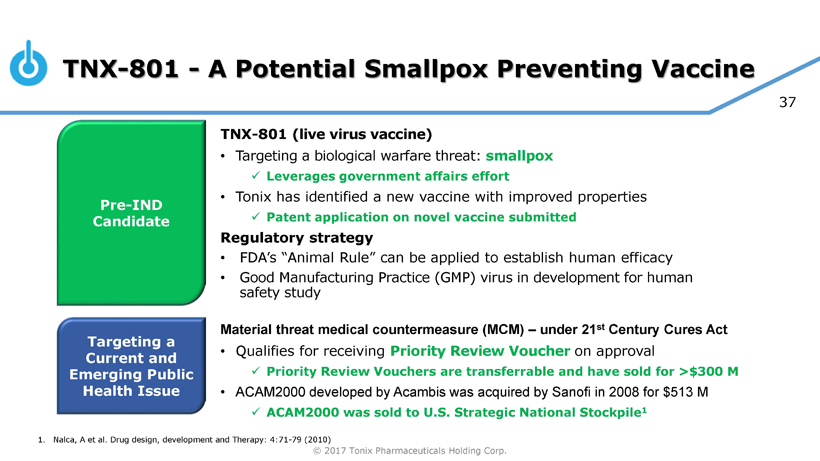
© 2017 Tonix Pharmaceuticals Holding Corp. 37 TNX - 801 - A Potential Smallpox Preventing Vaccine Pre - IND Candidate TNX - 801 (live virus vaccine) • Targeting a biological warfare threat: smallpox x Leverages government affairs effort • Tonix has identified a new vaccine with improved properties x Patent application on novel vaccine submitted Regulatory strategy • FDA’s “Animal Rule” can be applied to establish human efficacy • Good Manufacturing Practice (GMP) virus in development for human safety study Targeting a Current and Emerging Public Health Issue Material threat medical countermeasure (MCM) – under 21 st Century Cures Act • Qualifies for receiving Priority Review Voucher on approv al x Priority Review Vouchers are transferrable and have sold for >$300 M • ACAM2000 developed by Acambis was acquired by Sanofi in 2008 for $513 M x ACAM2000 was sold to U.S. Strategic National Stockpile 1 1. Nalca , A et al. Drug design, development and Therapy: 4:71 - 79 (2010)
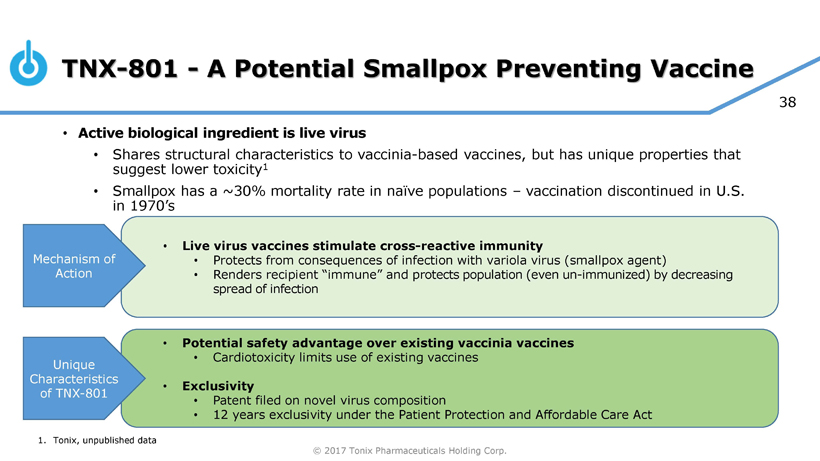
© 2017 Tonix Pharmaceuticals Holding Corp. 38 • Live virus vaccines stimulate cross - reactive immunity • Protects from consequences of infection with variola virus (smallpox agent) • Renders recipient “immune” and p rotects population (even un - immunized) by decreasing spread of infection TNX - 801 - A Potential Smallpox Preventing Vaccine • Potential safety advantage over existing vaccinia vaccines • Cardiotoxicity limits use of existing vaccines • Exclusivity • Patent filed on novel virus composition • 12 years exclusivity under the Patient Protection and Affordable Care Act Mechanism of Action Unique Characteristics of TNX - 801 1. Tonix, unpublished data • Active biological ingredient is live virus • Shares structural characteristics to vaccinia - based vaccines, but has unique properties that suggest lower toxicity 1 • Smallpox has a ~30% mortality rate in naïve populations – vaccination discontinued in U.S. in 1970’s
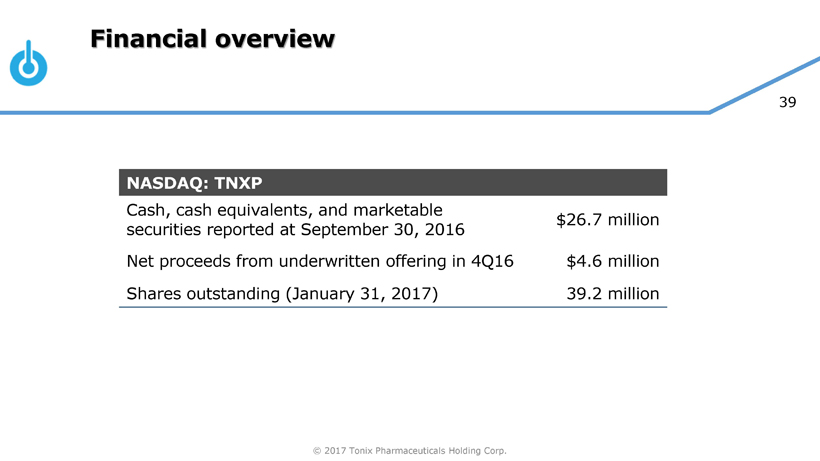
© 2017 Tonix Pharmaceuticals Holding Corp. 39 Financial overview NASDAQ: TNXP Cash, cash equivalents, and marketable securities reported at September 30, 2016 $26.7 million Net proceeds from underwritten offering in 4Q16 $4.6 million Shares outstanding (January 31, 2017) 39.2 million
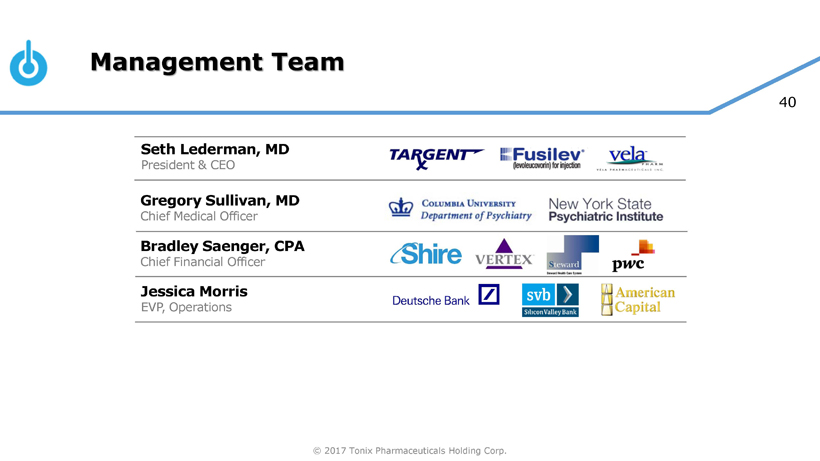
© 2017 Tonix Pharmaceuticals Holding Corp. 40 Management Team Seth Lederman, MD President & CEO Jessica Morris EVP, Operations Gregory Sullivan, MD Chief Medical Officer Bradley Saenger, CPA Chief Financial Officer
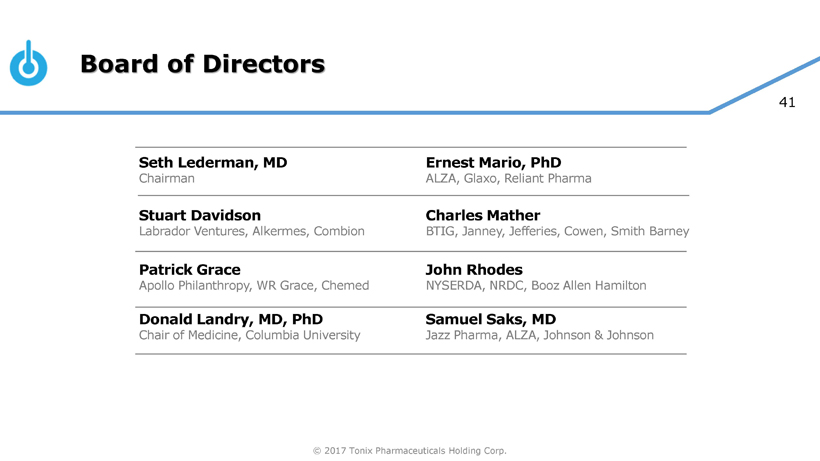
© 2017 Tonix Pharmaceuticals Holding Corp. 41 Board of Directors Seth Lederman, MD Chairman Ernest Mario, PhD ALZA, Glaxo, Reliant Pharma John Rhodes NYSERDA, NRDC, Booz Allen Hamilton Samuel Saks, MD Jazz Pharma, ALZA, Johnson & Johnson Charles Mather BTIG, Janney, Jefferies, Cowen, Smith Barney Stuart Davidson Labrador Ventures, Alkermes , Combion Patrick Grace Apollo Philanthropy, WR Grace, Chemed Donald Landry, MD, PhD Chair of Medicine, Columbia University
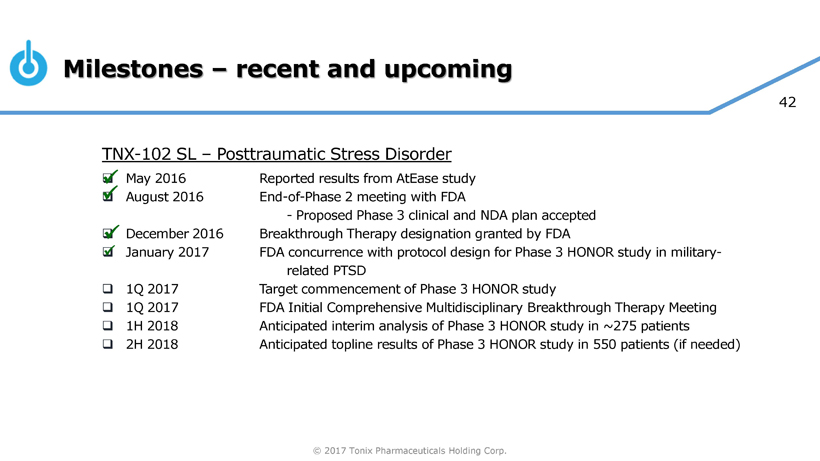
© 2017 Tonix Pharmaceuticals Holding Corp. 42 Milestones – recent and upcoming TNX - 102 SL – Posttraumatic Stress Disorder □ May 2016 Report ed results from AtEase study □ August 2016 End - of - Phase 2 meeting with FDA - Proposed Phase 3 clinical and NDA plan accepted □ December 201 6 Breakthrough Therapy designation granted by FDA □ January 201 7 FDA concurrence with protocol design for Phase 3 HONOR study in military - related PTSD □ 1Q 2017 Target commencement of Phase 3 HONOR study □ 1Q 2017 FDA Initial Comprehensive Multidisciplinary Breakthrough Therapy Meeting □ 1 H 201 8 Anticipated interim analysis of Phase 3 HONOR study in ~ 275 patients □ 2 H 201 8 Anticipated topline results of Phase 3 HONOR study in 550 patients (if needed) x x x x
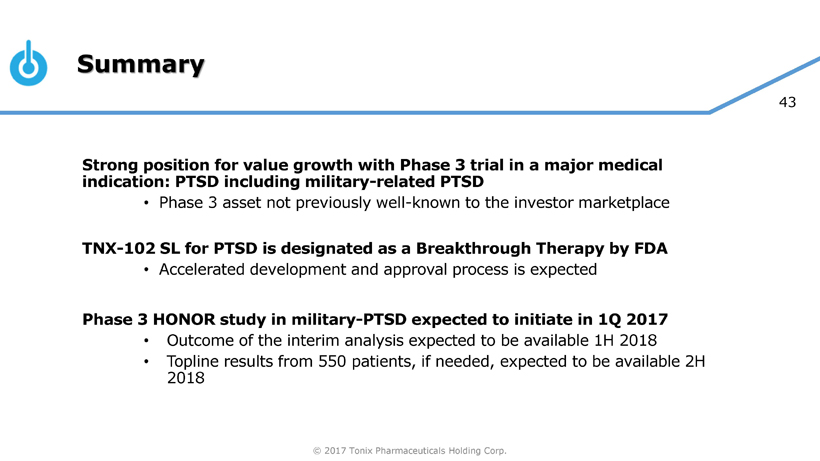
© 2017 Tonix Pharmaceuticals Holding Corp. 43 Summary Strong position for value growth with Phase 3 trial in a major medical indication: PTSD including military - related PTSD • Phase 3 asset not previously well - known to the investor marketplace TNX - 102 SL for PTSD is designated as a Breakthrough Therapy by FDA • Accelerated development and approval process is expected Phase 3 HONOR study in military - PTSD expected to initiate in 1Q 2017 • Outcome of the interim analysis expected to be available 1 H 201 8 • Topline results from 550 patients, if needed, expected to be available 2 H 201 8
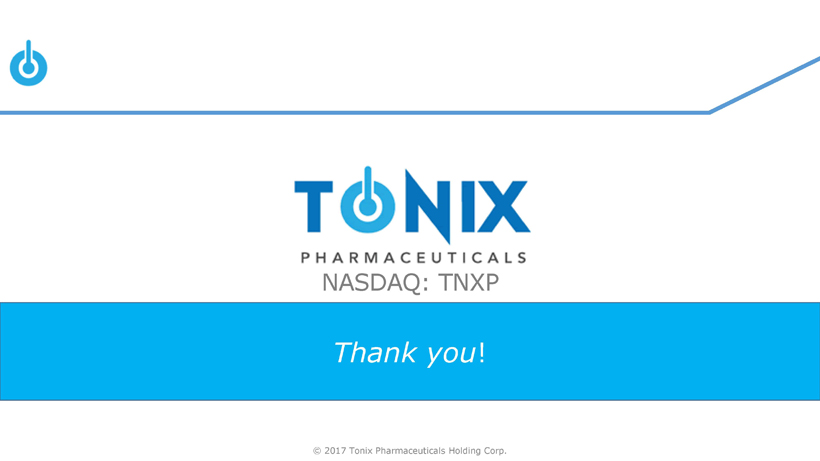
© 2017 Tonix Pharmaceuticals Holding Corp. Thank you ! NASDAQ: TNXP